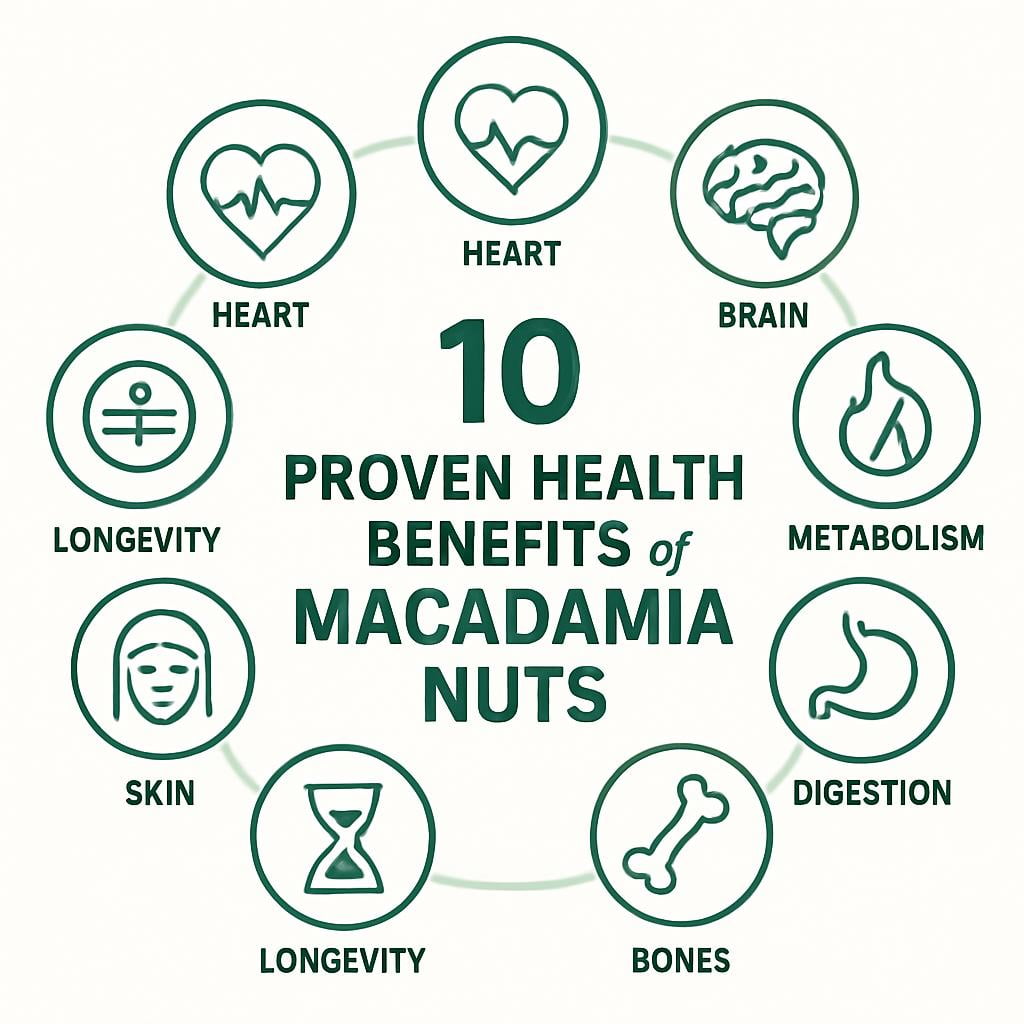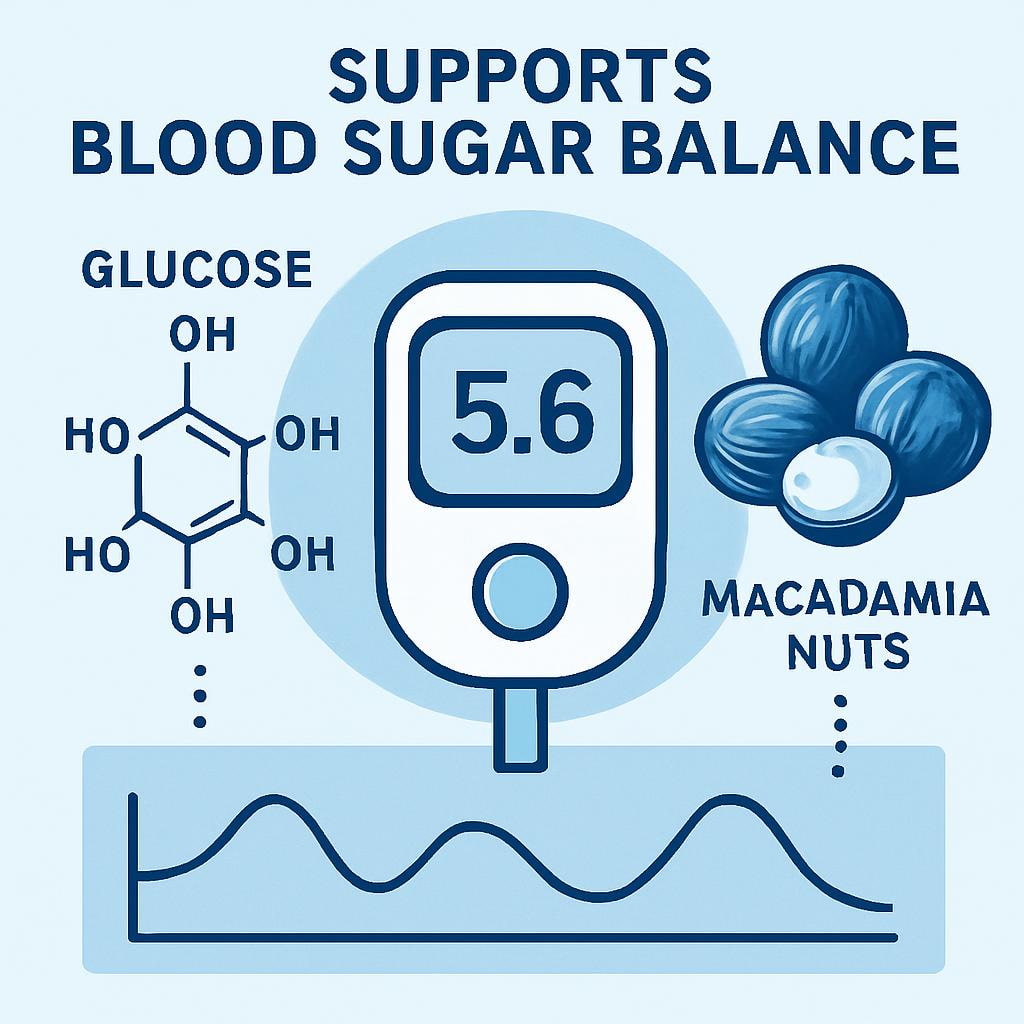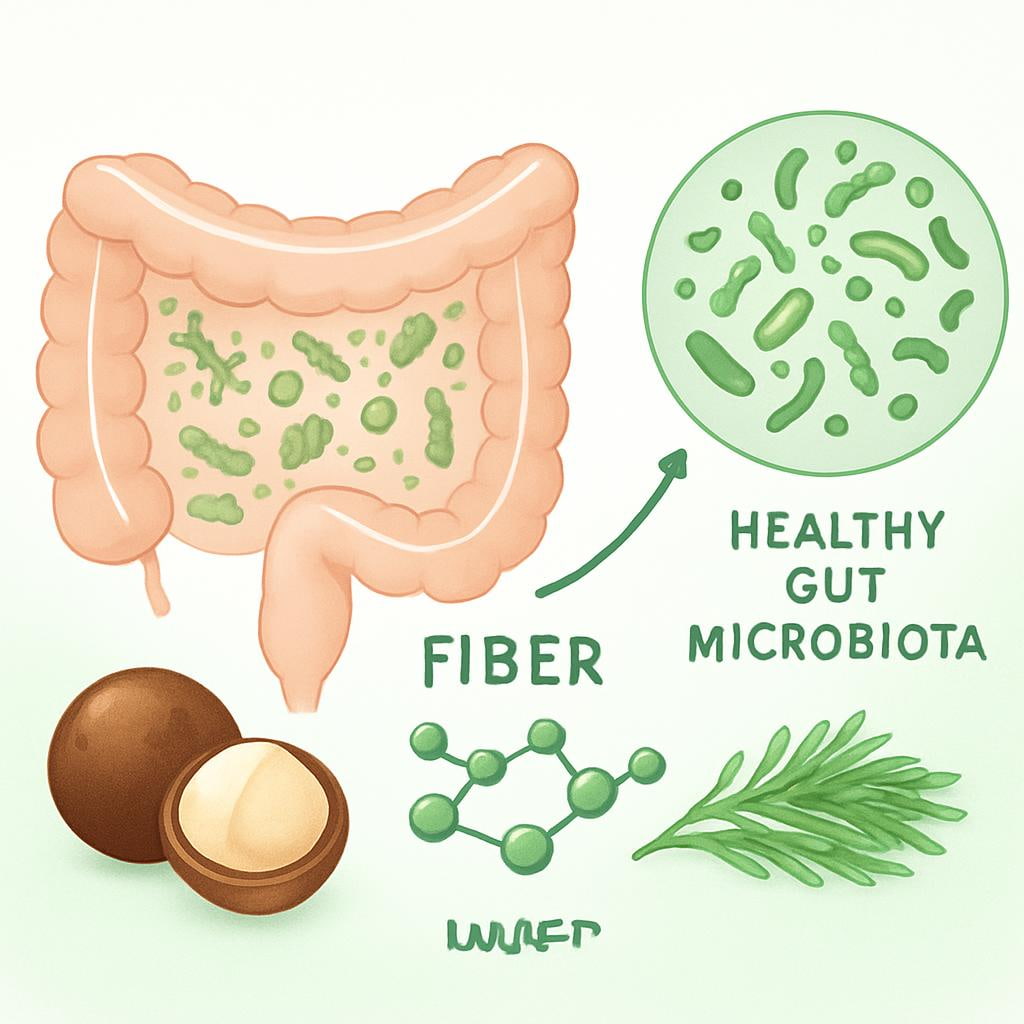Macadamia nuts may support heart health, metabolism, and overall wellness when consumed in moderation.
These rich, buttery nuts are more than just a tasty snack — they’re packed with healthy fats, fiber, and antioxidants that benefit your body from the inside out. Understanding how macadamia nuts work in your diet can help you make smarter, heart-friendly food choices.

What Are Macadamia Nuts?
Macadamia nuts are native to Australia but are now widely grown in Hawaii, South Africa, and Latin America. They come from the Macadamia integrifolia tree and are prized for their smooth texture and mild, buttery flavor.
Nutritionally, they’re high in monounsaturated fats — the same heart-healthy fats found in olive oil and avocados — and low in carbs, making them ideal for balanced and low-carb diets.

Nutritional Profile of Macadamia Nuts (Per 1 oz / 28 g)
| Nutrient | Amount | % Daily Value* |
|---|---|---|
| Calories | 200 | — |
| Total Fat | 21 g | 27% |
| Saturated Fat | 3.4 g | 17% |
| Monounsaturated Fat | 17 g | — |
| Protein | 2.2 g | 4% |
| Carbohydrates | 3.9 g | 1% |
| Fiber | 2.4 g | 9% |
| Manganese | 1.0 mg | 50% |
| Thiamin (B1) | 0.34 mg | 28% |
| Copper | 0.2 mg | 22% |
| Magnesium | 36 mg | 9% |
| Iron | 1.0 mg | 6% |
Source: USDA FoodData Central, 2024
10 Proven Health Benefits of Macadamia Nuts (Backed by Science)
Research shows that macadamia nuts are more than a delicious snack — they’re a nutritional powerhouse rich in heart-healthy fats, fiber, vitamins, and antioxidants. When consumed in moderation, they can support cardiovascular wellness, metabolic balance, and long-term health.
1. Supports Heart Health

Macadamia nuts are particularly rich in monounsaturated fatty acids (MUFA) — the same beneficial fats found in olive oil — which may help reduce LDL (“bad”) cholesterol and improve HDL (“good”) cholesterol levels.
A 2022 study published in the Journal of Nutritional Biochemistry found that daily consumption of macadamia nuts led to improved lipid profiles and arterial elasticity.
According to the American Heart Association, replacing saturated fats with unsaturated fats from sources like macadamias supports cardiovascular health and reduces the risk of heart disease.
2. May Help Manage Weight

Although calorie-dense, macadamia nuts promote satiety and appetite control due to their unique balance of healthy fats, fiber, and protein. These nutrients slow digestion and help regulate hunger hormones.
A 2023 review in Frontiers in Nutrition found that people who regularly consume nuts tend to have lower body weight and smaller waist circumference, even with higher total energy intake.
Including a small handful (about 10–12 nuts) can be a satisfying way to replace processed snacks and support healthy weight management.
3. Promotes Brain Function

Macadamia nuts provide oleic acid and palmitoleic acid, fatty acids that support nerve membrane structure and communication. These fats are vital for maintaining cognitive performance and neurological function.
They are also a notable source of thiamin (vitamin B1), which converts carbohydrates into glucose — the brain’s primary fuel.
According to the National Institutes of Health Office of Dietary Supplements, adequate thiamin intake supports normal nerve and muscle function.
4. Supports Blood Sugar Balance

With a low glycemic index and minimal carbohydrates, macadamia nuts may help stabilize blood sugar and improve insulin response.
A 2020 study published in Nutrients reported that substituting refined carbohydrates with tree nuts enhanced insulin sensitivity and lipid metabolism in individuals with metabolic syndrome.
For those managing prediabetes or type 2 diabetes, replacing sugary snacks with unsalted macadamias may be a heart-friendly and blood-sugar-friendly choice.
5. Rich in Antioxidants

Macadamia nuts contain potent antioxidants, including flavonoids and tocotrienols (a form of vitamin E), which help protect cells from oxidative stress and support immune function.
These compounds may reduce chronic inflammation — a key factor linked with heart disease, metabolic disorders, and cellular aging.
The Harvard T.H. Chan School of Public Health notes that antioxidant-rich foods contribute to long-term cellular protection and overall wellness.
6. May Support Gut and Digestive Health

Each serving (about 1 oz) of macadamia nuts provides roughly 2.4 g of fiber, which supports healthy digestion and promotes beneficial gut bacteria growth.
Fiber contributes to bowel regularity, feeds good gut microbes, and may help regulate appetite and blood sugar.
For optimal gut balance, pair macadamia nuts with other fiber-rich foods such as fruits, vegetables, and whole grains, as recommended by the Cleveland Clinic.
7. Contributes to Bone and Joint Health

Macadamia nuts are rich in magnesium, manganese, and phosphorus, minerals that play a crucial role in bone density and connective tissue maintenance.
Magnesium helps regulate calcium absorption, while manganese supports collagen formation and bone metabolism.
According to the National Institutes of Health, sufficient magnesium intake supports healthy bones and muscle function.
8. May Improve Skin Health

The oil in macadamia nuts is high in palmitoleic acid, a rare omega-7 fatty acid that supports skin hydration and elasticity.
This lipid mimics natural sebum, helping to maintain a healthy moisture barrier and protect against oxidative damage from environmental stress.
Research summarized by the Journal of Cosmetic Dermatology suggests that nutrient-dense oils rich in unsaturated fats contribute to smoother, more resilient skin over time.
9. May Support Immune Function

Macadamia nuts supply trace minerals such as copper and manganese, which are essential for the production of antioxidant enzymes that protect against oxidative stress.
These nutrients assist in collagen synthesis, supporting tissue repair and immune resilience.
The Linus Pauling Institute at Oregon State University highlights copper’s role in enzyme activation and immune defense.
10. Promotes Longevity and Metabolic Health

Regular consumption of nuts — including macadamias — is linked to a lower risk of metabolic disorders and longer lifespan.
Large cohort studies from the Harvard T.H. Chan School of Public Health show that frequent nut eaters have reduced risks of cardiovascular disease, diabetes, and premature mortality.
Replacing processed snacks with nutrient-rich nuts can be an easy, evidence-based way to support long-term metabolic and heart health.
How to Eat Macadamia Nuts for Best Results

Enjoying macadamia nuts the right way ensures you gain all their health-supportive benefits without overdoing calories. Moderation and quality are key.
Serving Size:
A healthy portion is about 1 oz (10–12 whole nuts) per serving, two to four times per week. This provides heart-healthy fats, fiber, and antioxidants without excess calories.
Best Preparation Methods:
- Raw or Dry-Roasted: Choose unsalted, unflavored varieties to avoid added sodium and unhealthy oils.
- Avoid Deep-Fried or Candied Versions: These often contain hydrogenated fats and added sugars that negate their nutritional value.
- Macadamia Nut Oil: A great substitute for butter or vegetable oil in cooking — stable at high heat and rich in monounsaturated fats.
Healthy Pairing Ideas:
- Sprinkle crushed macadamias on oatmeal, yogurt, or smoothie bowls.
- Mix with leafy greens, avocado, or berries in salads.
- Add to whole-grain pancakes or baked goods for a nutrient boost.
- Pair with protein-rich foods like Greek yogurt or eggs for balanced meals.
The Harvard T.H. Chan School of Public Health recommends incorporating nuts into a balanced eating pattern to replace refined carbohydrates or processed snacks for long-term heart health.
Possible Side Effects and Precautions
Macadamia nuts are safe for most people, but mindful consumption is important — especially for those with nut allergies or calorie restrictions.
1. Allergic Reactions:
Like other tree nuts, macadamia nuts can cause allergic reactions in sensitive individuals. Symptoms may include itching, swelling, hives, or difficulty breathing, and severe cases can lead to anaphylaxis.
The American Academy of Allergy, Asthma & Immunology (AAAAI) notes that tree-nut allergies often persist for life and require strict avoidance and awareness of cross-contact risks. The American College of Allergy, Asthma & Immunology (ACAAI) advises individuals with known allergies to carry epinephrine and consult an allergist for personalized management.
If you have a nut allergy, avoid macadamia products and always check ingredient labels before eating.
2. Calorie Density:
Each ounce of macadamia nuts provides around 200 calories. Overeating may contribute to excess calorie intake and weight gain. Balance your serving size with fruits, vegetables, and lean proteins.
3. Fat-Restricted Diets:
People with gallbladder or pancreatic disorders may need to limit high-fat foods. Speak with a registered dietitian for personalized guidance.
4. Pet Safety:
Macadamia nuts are toxic to dogs and can cause vomiting, weakness, tremors, and fever within hours of ingestion.
The U.S. Food and Drug Administration (FDA) lists macadamia nuts among foods dangerous to pets, and the Merck Veterinary Manual warns that even small amounts can trigger symptoms.
Always store macadamia nuts securely and contact a veterinarian immediately if your dog eats any.
Recommended Daily Intake, Safety, and Storage
To get the most from macadamia nuts, focus on portion control and proper storage to preserve freshness and nutrients.
Recommended Daily Intake:
- Adults: 1 oz (10–12 nuts) per day or a few times weekly.
- Children: Smaller portions based on calorie needs, under adult supervision (avoid whole nuts for children under 4 years due to choking risk).
Safety Tips:
- Opt for unsalted, uncoated nuts to reduce sodium and sugar.
- People with nut allergies should avoid cross-contamination with other foods.
Storage Guidelines:
Proper storage prevents rancidity and preserves flavor.
- Temperature: Store in a cool, dry place below 25 °C (77 °F).
- Container: Use airtight glass jars or sealed pouches.
- Refrigeration: Extend shelf life by refrigerating or freezing.
- Shelf Life: Up to 3 months at room temperature or 6 months in the refrigerator.
The FDA Food Storage Safety Guidelines recommend keeping nuts in airtight containers and away from direct heat and moisture to prevent spoilage.
Frequently Asked Questions (FAQ)
Q1. Are macadamia nuts keto-friendly?
Yes. Macadamia nuts are naturally low in carbohydrates and high in healthy fats, making them one of the best nut options for ketogenic and low-carb diets.
Q2. Can macadamia nuts help lower cholesterol?
They may help improve cholesterol levels when eaten instead of saturated fats. Studies show that monounsaturated fats support cardiovascular health and reduce LDL levels.
Q3. Are macadamia nuts safe for people with diabetes?
Yes. Their low glycemic index and high monounsaturated fat content may help regulate blood sugar and improve insulin sensitivity.
Q4. How many macadamia nuts should I eat daily?
A serving of 1 oz (10–12 nuts) is sufficient for most adults to enjoy their benefits without excessive calories.
Q5. Are roasted macadamia nuts still healthy?
Yes — if they are dry-roasted without added oils or salt. Avoid nuts roasted in hydrogenated fats or coated with sugar.
Q6. Can macadamia nuts cause allergies?
Yes, though rare. People with tree nut allergies should avoid them and check labels for cross-contamination risks.
Q7. Can pets eat macadamia nuts?
No. Macadamia nuts are toxic to dogs and can cause serious health problems. Keep them stored safely away from pets.
Conclusion
Macadamia nuts are a nutrient-rich food that supports heart, brain, and metabolic health when enjoyed in moderation. Their unique blend of monounsaturated fats, antioxidants, and minerals makes them a valuable addition to a balanced diet.
Replace processed snacks with a small handful of macadamias a few times per week to enjoy lasting benefits for wellness, energy, and longevity — all backed by science.
This content is for informational purposes only and not medical advice.
References:
- USDA FoodData Central – Macadamia Nuts (Nutrition Facts): https://fdc.nal.usda.gov/fdc-app.html#/food-details/170164/nutrients
- American Heart Association – Fats 101: The Truth About Fats: https://www.heart.org/en/healthy-living/healthy-eating/eat-smart/fats
- Nutrients Journal – Tree Nuts and Insulin Sensitivity in Metabolic Syndrome (2020 Study): https://www.mdpi.com/2072-6643/12/9/2773
- Harvard T.H. Chan School of Public Health – Nuts and Cardiometabolic Health: https://www.hsph.harvard.edu/nutritionsource/food-features/nuts/
- Cleveland Clinic – Why Fiber Is Good for You: https://health.clevelandclinic.org/why-fiber-is-good-for-you/
